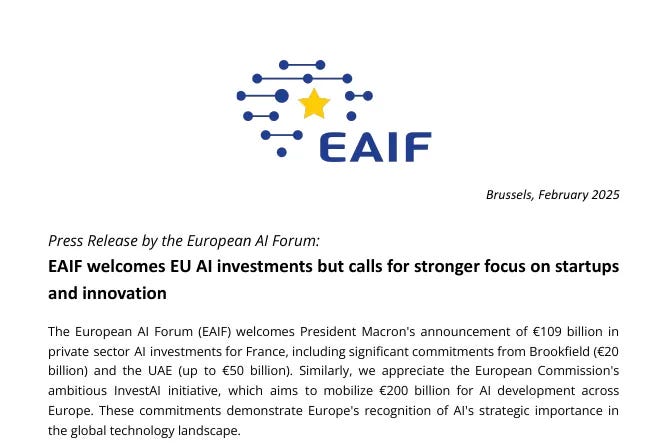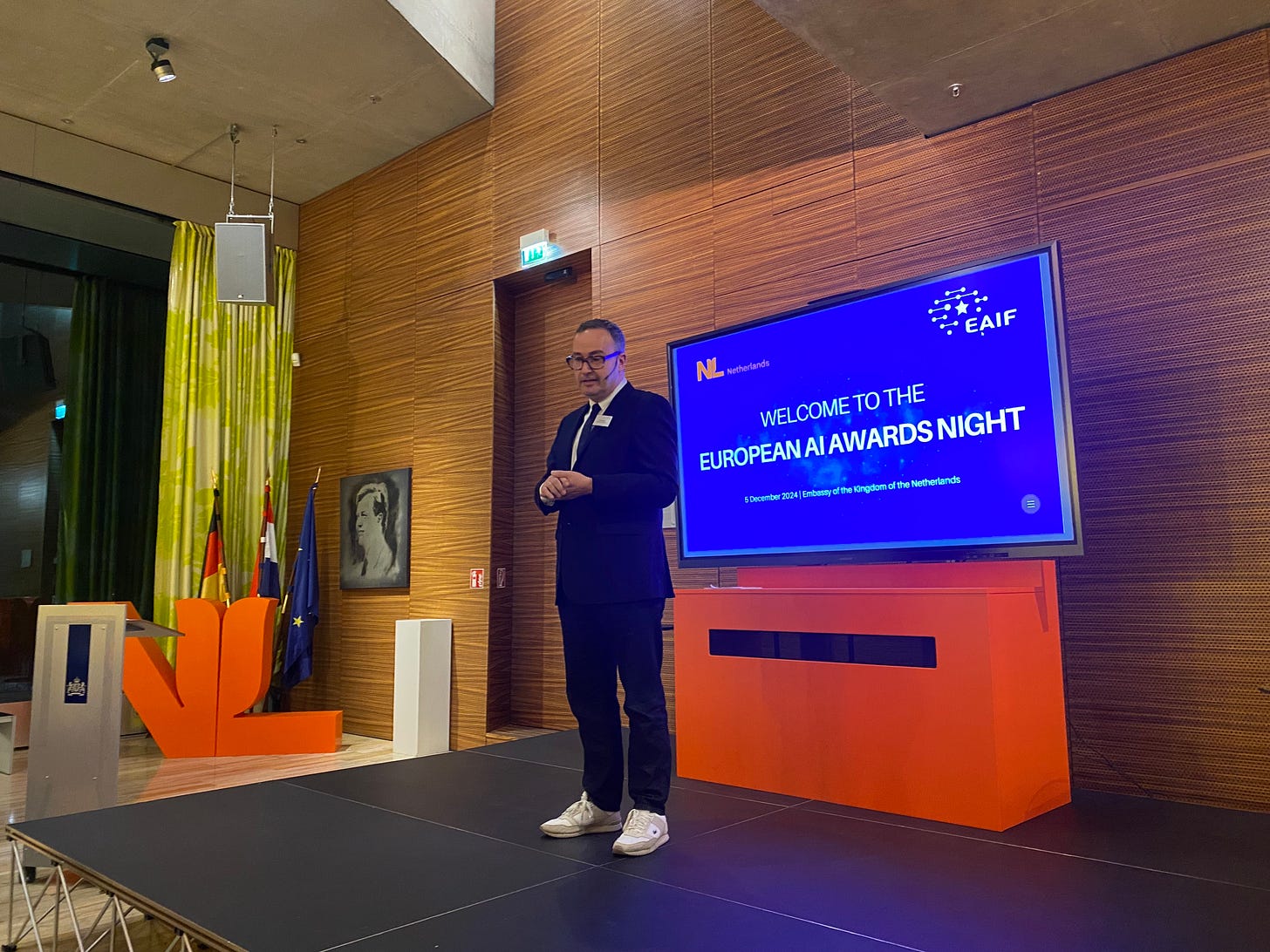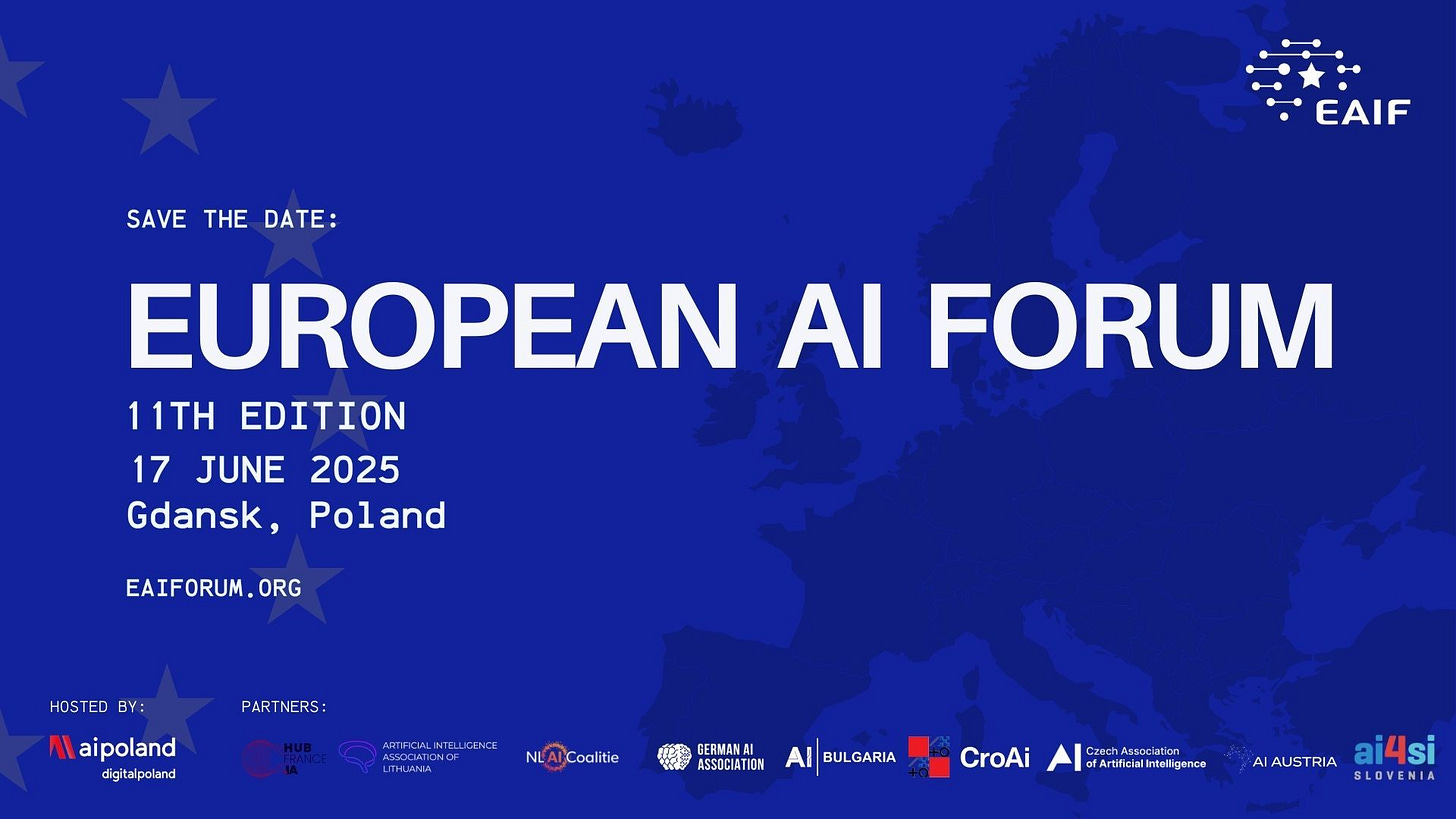EAIF newsletter
European AI Forum (EAIF) newsletter provide you on a monthly basis with insights, news and updates from the European AI ecosystem. AI regulation and EU policy, national AI activities, upcoming events.
In this 2025 January/December newsletter you can find the following topics:
EAIF position on EU AI Investments
EAIF position on DeepSeek & USA Investment announcments
EAIF at AI Action summit
EAIF at Davos 2025
Announcing the Winners of the First European AI Awards
10th European AI Forum in Berlin
Save the date 11th European AI Forum in Gdansk
EAIF position on EU AI Investments
The European AI Forum (EAIF) welcomes the significant AI investments announced for France and the EU, including the €200 billion InvestAI initiative, but stresses the need for these funds to reach startups and scaleups rather than just large corporations. While investments in AI infrastructure, such as gigafactories, are important, EAIF warns against prioritizing established players over innovative companies that drive AI advancements. With global competitors like the U.S. accelerating AI initiatives, Europe must adopt more dynamic, startup-friendly funding mechanisms to remain competitive. EAIF urges swift and strategic investment deployment to maximize impact.
EAIF Key Recommendations:
Our recommendations aim to rectify the current investment landscape by adopting a model similar to France's Tibi Initiative, with a specific focus on AI. This approach would invol mobilizing capital through partnerships with big companies and institutional investors such as Limited Partners (LPs) in Venture Capital (VC) and Private Equity (PE) to support AI innovation. Additionally, we emphasize the need for transparency in high-performance computing (HPC) usage and the importance of Data Spaces to bolster the AI ecosystem with necessary data resources.
For these investments to effectively strengthen Europe's AI competitiveness, EAIF recommend:
✅ Secure at least 50% of funds for AI startups and scale-ups
✅ Transparent reporting on fund distribution and innovation impact
✅ Open & accessible AI gigafactories for the entire ecosystem
✅ Fast-track funding for promising AI startups – funding within 6 months
✅ Reduce bureaucratic hurdles and accelerate European data spaces
✅ Merit-based allocation of GPUs & HPC resources
ADRA, EAIF and EIT position on DeepSeek & USA Investment announcments
We, Adra - AI-Data-Robotics-Association, EAIF - European AI Forum, and EIT Digital, have come together to issue a joint statement in response to the recent announcements of Stargate and DeepSeek.
These developments mark a pivotal moment in the AI landscape, with significant implications for Europe’s AI ecosystem, innovation, and global competitiveness. As key stakeholders, we believe this is a crucial time to align our vision and priorities for the responsible and strategic advancement of AI in Europe.
🌍 Europe cannot afford to stand still. 🌍
Rather than reacting with fear, this is a defining moment for the EU to step up and take bold action. Relying on non-European AI providers is no longer an option. We must invest in AI infrastructure, streamline regulations, and foster innovation—ensuring a sovereign, competitive, and energy-efficient European AI ecosystem.
⚡ Now is the time for the EU:
✅ Policy-makers must leverage momentum from industry to consider a bold and ambitious strategy to double-down on the AI opportunity.
✅ Collaborate more closely to craft a public-private venture together with key colleagues in the EC that will unlock value and return on investment for industry; enhance our AI infrastructure and research; and accelerate innovation and the deployment of state-of-the-art AI, Data and Robotics technologies made in Europe.
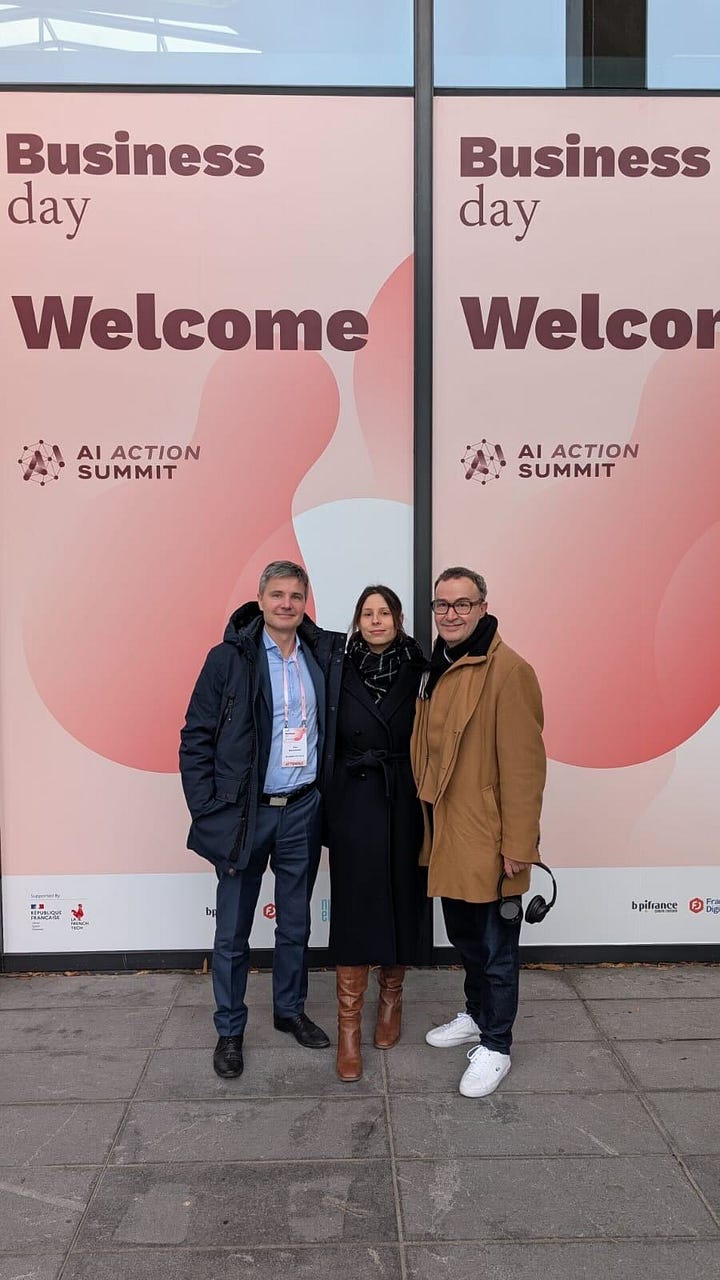
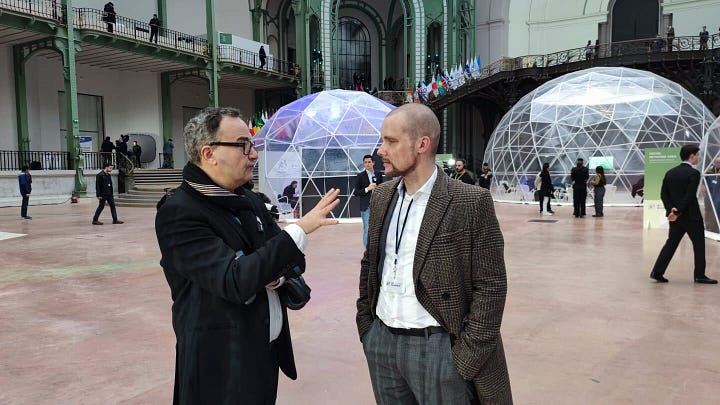
EAIF at AI Action summit
The AI Action Summit held in Paris on February 10-11, 2025, was a significant gathering aimed at shaping the future of artificial intelligence governance. Co-chaired by French President Emmanuel Macron and Indian Prime Minister Narendra Modi, the summit brought together nearly 100 countries, tech leaders, and civil society representatives to discuss AI's economic, societal, and ethical implications. Key topics included public interest AI, the future of work, innovation, ethics, and regulation. The event saw substantial financial commitments, with France securing over €109 billion in AI investments, and initiatives like Current AI aiming to raise up to $2.5 billion for public-interest AI projects. However, the summit also highlighted geopolitical tensions as the U.S. and U.K. refused to sign a joint statement on ethical AI development, underscoring a divide in global AI governance approaches.
The EAIF participated in AI Action Summit and discussed the current situation of EU in world wide race of AI.

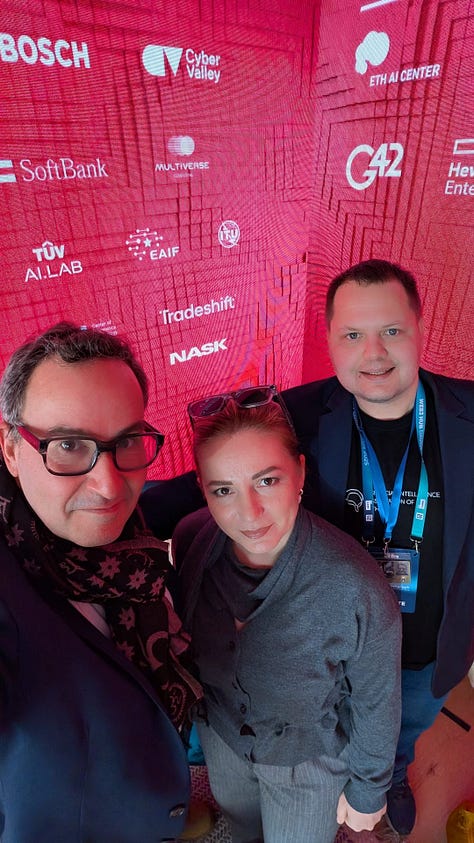
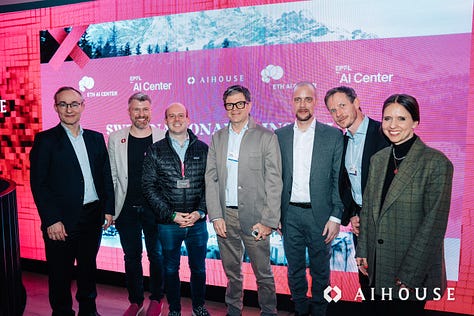
EAIF at Davos 2025
The World Economic Forum in Davos 2025 was marked by a significant focus on artificial intelligence (AI), reflecting both the optimism and caution surrounding its rapid development. Discussions at the forum underscored the dual nature of AI as both a transformative force for economic growth and a potential source of cybersecurity risks. The theme "Collaboration for the Intelligent Age" highlighted AI's role in addressing global challenges, from environmental issues to enhancing cybersecurity. CEOs and tech leaders expressed enthusiasm for AI agents, which are expected to evolve from mere information providers to entities that could take autonomous actions in the real world.
The main AI topics were discussed at AI House. The Guest country of AI House this year was Poland. The EAIF was the partner of AI House. Among the key figures the Yan LeCun, the Chief AI Scientist of Meta AI, Yoshua Bengio, Aidan Gomez, the co-founder of Cohere, Jonas Andrulis, the CEO Aleph Alpha and many more was among the speakers. For instance, Marc Benioff of Salesforce suggested that today's CEOs might be the last to manage a purely human workforce, indicating a future where AI agents play a central role in business operations. Moreover, there was a strong push for ethical frameworks to guide AI development, ensuring that AI benefits are accessible and not just a privilege for a few.
Announcing the Winners of the First European AI Awards
The European AI Forum proudly presented the inaugural European AI Awards at the 10th European AI Forum conference, recognizing outstanding contributions in AI development, innovation, and policy across five categories.
🔹 AI Business
autoscriber (Netherlands) – AI-powered digital scribes for healthcare, reducing doctors' administrative workload.
Xayn (Germany) – Noxtua, Europe's first sovereign legal AI tool for confidential legal document analysis.
neuland.ai (Germany) – AI consulting for German SMEs, delivering tailored AI solutions.
🔹 AI Ecosystem Enabler
KI Park (Germany) – AI innovation hub connecting 200+ companies and research institutions.
France Travail (France) – Ethical AI leader in public employment services.
K.I.E.Z (Germany) – Berlin-based AI startup accelerator, supporting 188+ teams.
🔹 AI Policy Shapers
Kai Zenner (Germany) – Key figure in shaping EU AI policy and legislation.
Mariya Gabriel (Bulgaria) – Architect of Europe’s AI strategy and ethical guidelines.
🔹 AI Spin-Off
DeepL (Germany) – World-class neural machine translation.
ArtiQ (Belgium) – AI-driven respiratory disease diagnostics.
Mistral AI (France) – Leading generative AI company with rapid growth.
Aleph Alpha (Germany) – Large-scale AI language models for businesses.
Graphcore (UK) – AI hardware accelerators transforming machine learning infrastructure.
🔹 AI Investors
Bpifrance (France) – Major AI and deep tech investor.
European Innovation Council (EU) – €10 billion fund supporting AI startups.
Index Ventures (Europe/Global) – Growth-stage AI investments, backing companies like DeepL.
Congratulations to all winners for their contributions to European AI excellence! 🚀🎉
10th European AI Forum in Berlin
The European AI Forum, now expanded to include the Czech AI Association, hosted its 10th edition in Berlin, focusing on the implementation of AI in Europe. Speakers from various countries emphasized the importance of harmonized standards, regulatory sandboxes, and AI literacy to ensure trustworthy AI. Discussions also touched on the AI Act, its implementation challenges, and the need for clear and fast national adoption to avoid the mistakes made with GDPR.
Various stakeholders are advocating for a simple structure and a one-stop agency for AI regulation in Germany, similar to the Dutch approach to taxes. Speakers highlighted successful AI integration cases, the need for private sector funding and called for better access to compute power for startups in Europe, as well as a more proactive approach to using AI in industry and the public sector. The event emphasized the importance of talents, data, and compute in the AI landscape, calling for more competitive possibilities for European AI talents, open source initiatives, and simpler regulations for AI adoption by SMEs.
The forum addressed the concept of European digital sovereignty in AI, cautioning against over-reliance on American technologies. Speakers like Clara Harano, from legal AI startup, emphasized that European digital and economic sovereignty has to be fought for by everyone, including policy makers, companies, and society. Yana Bryson, professor of ethics and technology, underscored the need for enforcing regulations like the Digital Services Act and the Digital Markets Act and addressing global utilities for data.
Save the date 11th European AI Forum in Gdansk
Have news to share: newsletter@eaiforum.org
Contact: info@eaiforum.org
Website: eaiforum.org
LinkedIn: linkedin.com/company/eaiforum


